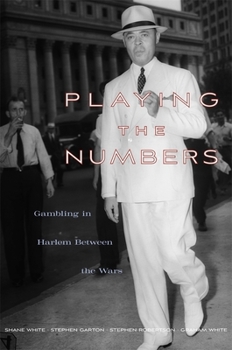Playing the Numbers: Gambling in Harlem Between the Wars
Select Format
Select Condition 
Book Overview
The phrase "Harlem in the 1920s" evokes images of the Harlem Renaissance, or of Marcus Garvey and soapbox orators haranguing crowds about politics and race. Yet the most ubiquitous feature of Harlem life between the world wars was the game of "numbers." Thousands of wagers, usually of a dime or less, would be placed on a daily number derived from U.S. bank statistics. The rewards of "hitting the number," a 600-to-1 payoff, tempted the ordinary...
Format:Hardcover
Language:English
ISBN:0674051076
ISBN13:9780674051072
Release Date:May 2010
Publisher:Harvard University Press
Length:320 Pages
Weight:0.90 lbs.
Dimensions:1.1" x 5.8" x 8.3"
Related Subjects
African-American Studies Ethnic Studies Gambling Games History Lotteries Specific DemographicsCustomer Reviews
0 rating





